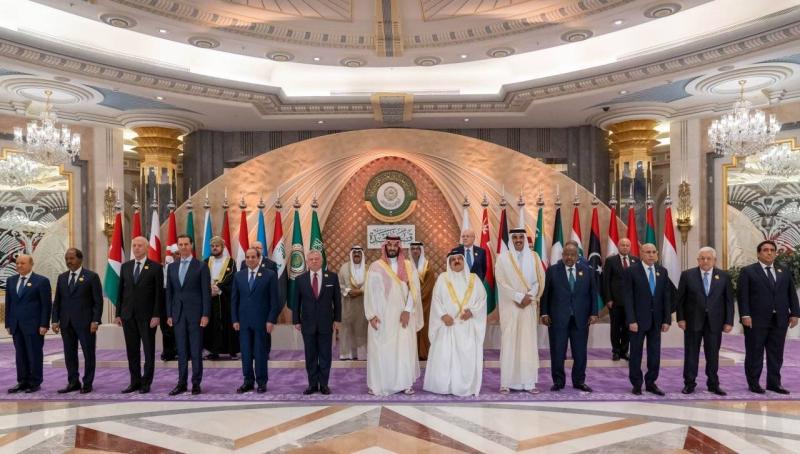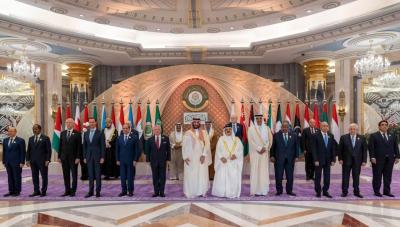Saudi Crown Prince Mohammed bin Salman concluded the Arab Summit by announcing the approval of its final statement by the participants, which encompassed several key issues.
Today, Friday, the 32nd Arab League Summit launched in Jeddah, Saudi Arabia, addressing several major topics, including the Palestinian issue and the Sudanese crisis, as well as economic matters within the framework of development plans for the Arab League. The Secretary-General of the Arab League, Ahmed Aboul Gheit, expressed during the summit's opening that there is an opportunity to address the crisis in Syria, welcoming the presence of Syrian President Bashar al-Assad at the summit. Aboul Gheit called for the preservation of Sudan and its resources, noting that the international scene is experiencing one of the most dangerous periods in contemporary history.
Saudi Crown Prince Mohammed bin Salman expressed his pleasure at the attendance of President Bashar al-Assad at the summit, stating, "We hope that Syria's return to the Arab League contributes to its support," emphasizing that the Palestinian issue is the central issue for Arabs and Muslims and is a top priority for the Kingdom. The Crown Prince also indicated Saudi Arabia's readiness to mediate between Russia and Ukraine, reiterating the Kingdom's supportive position toward any efforts to reduce the severity of the crisis in Ukraine and prevent deterioration in humanitarian conditions.
Syrian President Bashar al-Assad remarked, "We are facing a historical opportunity," to reorganize the Arab house with minimal foreign intervention, indicating that joint Arab action needs common objectives, unified policies, and clear principles. He emphasized the need to seek out the overarching issues "that threaten our future and create our crises so that we do not drown and burden future generations with addressing the outcomes rather than the causes." In his speech, he stressed the necessity for "the world to leave the internal issues to our peoples and that we should reject foreign interventions," noting that "Syria, its present, past, and future, is Arabism."
The Emir of Qatar, Sheikh Tamim bin Hamad Al Thani, unexpectedly left the summit after leading his delegation without delivering a speech during the live coverage of the event. An Arab official stated that the Emir left before President Assad's address. Commenting on the Emir's departure, several media personnel reported that the atmosphere of the day was "positive," and there were no tensions except for the Syrian delegation's stance. The Emir expressed before leaving that the visit was one of "goodwill."
Lebanese Prime Minister Najib Mikati confirmed that Lebanon is unable to host more Syrian refugees, calling for a roadmap for their return to their homeland. He stated, "Lebanon continues to suffer from multiple crises and is living through difficult years," noting that the Lebanese crisis has worsened with the vacancy in the presidency. Mikati noted that it is not strange for the Saudi Crown Prince to be "a support to Lebanon," adding, "We look forward to the Kingdom's support so we can recover."
The Sudanese delegation head, appointed by the Sovereign Council President Abdel Fattah al-Burhan, expressed concern about the international community's indifference to "the violations of armed rebellion" in Sudan, pointing out that the Rapid Support Forces did not adhere to the ceasefire agreements, attacked embassies and the premises of Arab missions, and committed crimes against humanity. He affirmed that if the rebel forces "lay down their weapons, we will grant them amnesty."
The President of the Yemeni Presidential Leadership Council, Rashad Mohammed al-Alimi, stressed the need to end the coup against Yemeni state institutions by "Iran-backed forces," considering that the Houthis continue to threaten the security of neighboring countries using drones and missiles, hoping that the "coalition" would support legitimacy and work to stop Houthi violations. He stated, "Our people are suffering from the ravages of war, and Houthi forces continue to prevent ships from reaching our ports."
Algerian Prime Minister Ayman Ben Abdel Rahman, who opened the summit meeting, pointed out that the motto "Coming Together" is summarized by Syria's return to occupy its seat in the Arab League, demanding that the international community assume its responsibility towards the Palestinian people and calling for swift action to resolve the Sudanese crisis without external interference.
Egyptian President Abdel Fattah el-Sisi noted that the region is undergoing difficult circumstances that require decisive solutions, emphasizing the need for joint Arab cooperation, stating that Egypt will continue its efforts to stabilize the ceasefire in Gaza. He said, "It is essential to activate the concept of Arab collective action."
The Head of the Libyan Presidential Council, Mohamed al-Menfi, reaffirmed the importance of employing Libyan dialogue "according to a road map that preserves state institutions," indicating that Libya is coordinating with the United Nations Mission to unify the Libyan armed forces, stating, "We seek to hold elections before the end of the year."
Regarding Tunisia, President Kais Saied affirmed that a limit must be set on violations against the Palestinian people and the international silence surrounding them. Saied indicated that Tunisia is "steadfast" in its stability and will not engage in any alliances against others, rejecting becoming victims of a new world order.
Jordan's King Abdullah II emphasized that the Palestinian issue is "our central cause, and we work for Palestinians to obtain their state through just peace," indicating that "just and comprehensive peace is achieved through the Palestinians obtaining their legitimate rights."
Kuwaiti Crown Prince Mishal Al-Ahmad Al-Jaber Al-Sabah confirmed Kuwait's supportive positions towards the Palestinian cause and the unity of Syrian territory while rejecting foreign interventions in its affairs.
Iraqi Prime Minister Mohammed Shia' al-Sudani called on the Arab League to build an economic bloc and expressed hope for the attendance of Arab leaders at the next summit in the Iraqi capital. He noted the need to work to prevent Sudan from descending into conflict, adding that the drug crisis "requires a unified and decisive stance to stop its spread in our Arab countries."
Bahrain also supported the Palestinian people's right to establish their independent state, calling for achieving Arab integration. The Bahraini monarch, King Hamad bin Isa Al Khalifa, expressed hope for the success of efforts to resolve the conflict between Russia and Ukraine.
Palestinian President Mahmoud Abbas praised the unwavering positions of Arab leaders regarding the Palestinian issue, stating, "We resort to all international courts to restore Palestinian rights." Abbas called on the international community to provide protection to the Palestinian people and "hold Israel accountable for its crimes."
Oman welcomed efforts to revive Arab solidarity, while Djibouti's President Ismail Omar stated, "There must be unified Arab stances to confront challenges." The Somali President Hassan Sheikh Mahmoud commended all efforts made to stop the violence in Sudan.
Ukrainian President Volodymyr Zelensky addressed the Arab leaders, affirming that Ukraine will never succumb to Russian ambitions and will not engage in any hostile actions on the territories of other countries, stating, "What is happening in our country is a war, not just a conflict." He sought the delegations' support for the Ukrainian peace plan.
Zelensky arrived on a French governmental plane to participate in the summit. The President of the African Union Commission, Moussa Faki Mahamat, called for the formation of an international bloc to achieve peace and stability in Sudan, welcoming Saudi and US efforts for a ceasefire in Sudan.
A warm embrace occurred between Prince Mohammed bin Salman and President Assad upon his arrival at the summit hall, following 12 years of Syria's membership suspension. Prince Salman welcomed the leaders and heads of participating delegations as they arrived at the summit meeting hall in Jeddah. A handshake also took place between President Assad and the Emir of Qatar before entering the hall, followed by a side conversation between them, according to SANA.




